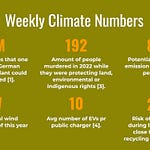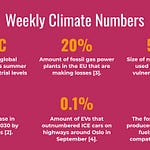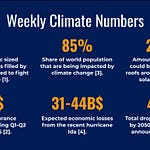Welcome to this weeks edition of The Weekly Climate 🎉
References: [1], [2], [3], [4], [5] and [6]
‼️News you can’t miss
Here’s one important scary/bad (🙀), good (😻), interesting (😼) and fossil (💩) news item.
🙀 Bitcoin miners forced a coal power plant in New York online.
😻 A really cool startup is making pollinator friendly solar farms.
😼 A great article by Amy Westervelt that shows us why we’re continuously failing to find the right solutions for the climate crisis.
💩 A new study shows that deaths from biomass now outnumbers those from coal and gas due to the phase out of mainly coal.
👩⚕️ Status: Climate & Science
Let’s look at how we’re doing this week!
[#guide] — The director of Project Drawdown Dr. Jonathan Foley attempts to cut through the noise and provides a brief guide to the climate crisis in three graphs and where we. can do the most. Personally, I think he’s lacking one graph (or maybe two graphs) and that is how far we are from a technological, political and society standpoints from reducing the emissions from those sources.
[#sealevel] — New climate models suggest that if we manage to keep warming between 1.5C and 2C sea levels are expected to rise between 6-11cm by 2100. Going beyond 2C and we dramatically risk unstoppable sea level rise. Another study published the same day goes as far as saying if we keep current policies we will be in for 25cm of sea level rise by 2100.
[#zombiefires] — A new kind of zombie fire has been discovered. Those still burning from last years California wildfires inside trees — a giant sequoia to be precise. Siberia is already on fire and we’re only May largely due to there underground zombie fires.
[#netzero] — Here’s an article that’s a few weeks old which I missed the first time around but I think it’s an important addition to the picture of the global climate crisis, especially if held together with the article about net-zero from last newsletter. In this article a group of climate scientists warns about the concept of net zero and how it is a dangerous trap, primarily because it leads us to believe that we can just burn away now and pay for it later in terms of offsets and other stuff. That is just not how it works at the timescale we’re at right now.
📰 The 7 Grand Challenges
⚡️Decarbonize Electricity
Clean electricity is the one do-or-die challenge we must solve.
[#coal] — A study published last week looks at what the energy transition from coal to gas and biomass means for air pollution. And turns out that biomass is making air pollution worse than coal and gas were. (Note air pollution here doesn’t mean CO2 emissions but particulate matter which causes health issues).
[#coal] — A new report by a US think tank concludes that most US coal power plants cannot compete with local solar and wind installations and is uneconomic to continue to operate. A total of 182 out of 230 coal power plants are uneconomic and/or scheduled for retirement.
[#hydrogen] — Yep this confirms pretty much what I’ve saying the whole time. Why do we want to use hydrogen in cars or to heat homes? Why go through the hazzle and the enormously electricity hungry task to convert water into hydrogen and then burn that hydrogen in a furnace or your car? Makes no sense why you just wouldn’t use the electricity directly in the first place for much higher efficiency. In addition, the only way to produce hydrogen in a more efficient way is to, you guessed it, convert it from methane. So this presents a big risk of us not killing off the fossil fuel industry. Let’s use hydrogen for the things it makes sense to use it for. And read this article if you don’t want to read my ramble :).
[#heatwaves] — Last year California’s grid got into big troubles due to a heatwave which I covered extensively here. New research suggest that California’s woes are a warning of what’s to come for many US cities. The study shows that many US cities are simply not ready to deal with these heat waves.
🏘 Reduce impact of urban and rural areas
Lowering the impact of urban and rural areas.
[#gas] — Just in case you’re not sick of me bashing gas stoves here’s a WSJ article that does just that. Citing multiple top chefs who attempts to kill the myth that gas is better to cook with than induction. It goes through all the usual arguments about why you should get rid of your gas stove (if you can).
[#ai] — Here’s an interesting article about how one startup is using AI to improve energy efficiency of buildings. The startup is using AI to control heating and cooling and are reducing buildings energy consumption by as much as 20-25%.
[#urbanization] — In a new book, Toronto’s mayor showcases a number of cities and how they’re helping to solve the climate crisis. He also explicitly highlights the importance of the mayor and city government. Many of these changes that needs to happen can happen very fast with just the right support.
🛁 Clean non-electrifiable activities
Some activities we do today can’t be electrified, these must be cleaned some other way.
[#aviation] — A new study by the Guardian and Greenpeace concludes that airlines must reduce emissions instead of offsetting as the study has found several problems with the offsetting schemes that the airlines are using. And here’s another article by The Guardian that goes a bit deeper. And here’s another one that goes into offsetting in general.
[#fgas] — A new rule proposed by the US EPA aims to phase-out HFCs by 85% over the next 15 years. This is expected to reduce emissions by 4.7Gt CO2eq before 2050 (or about 3 years of the US power sectors current emissions).
🌳 Protect and grow nature
Nature is our ally, we must protect it and help it help us.
[#nature] — Inside Climate News looks at natural climate solutions and highlights the fact that natural solutions will be critical to solving the climate crisis, but before nature can help us do that we must help restore and protect nature from us.
A startup, Navisun, from Massachusetts are building pollinator-friendly solar farms. It’s really pretty cool. The company has worked closely with experts to setup it’s small community owned solar farms to be friendly towards pollinators in areas that have seen rapidly decline in pollinators.
🍽 Optimize food
Without the lower impact of food or drink the hero doesn’t work (modified old danish proverb).
[#gourmet] — One of the best restaurants in the world New Yorks Eleven Madison Park which has been closed since March last year is going meatless and will open with a plant-based menu. It’s great to see big name restaurants like this one take the lead.
⚖️ Climate Justice
Without justice there’s no future.
[#activism] — Here’s a great couple of profiles of some of the young heroes of the climate movement. From wellknown faces such as 19-year old Jamie Margolin to 15-year old Saul Cantoral.
[#environmentalracism] — An image from last years DAVOS got a lot of attention for what it didn’t show: A 24-year old Ugandan activist. Her reaction on Twitter as well as the clear and in some way expected show of racism from A.P’s side prompted a world wide response that fortunately had the opposite effect, catapulting her and environmental racism into the spotlight.
[#covid] — If we look at the way the COVID vaccine crisis is being handled globally it doesn’t exactly bode well for the global south in terms of how the climate crisis will be handled. The differences between rich and poor countries in terms of vaccines is staggering. If we compare that to the already gigantic support gap there is in terms of support for climate adaptation in the global south well… Then it really doesn’t look very good. This article has the details.
[#refugees] — If you want a western look at what a climate refugee situation might look like, then look no further. A group of homeless people (who got homeless after a wildfire in California that destroyed the town of Paradise) is being chased around by police in Northern California.
⬇️ Engineered drawdown and geoengineering
Protecting our planet and species one way or another
[#dac] — According to Bloomberg, Direct Air Capture capacity is expected to increase 150 times before 2024. Current capacity is just around 6400tons of CO2, so a 150x increase equals 960.000tons out of the 34.000.000.000tons we currently emit. Or 35.000 times to little. Nature is currently in the lead as it captures about 20.000.000.000 or about half of our emissions every year.
[#keepitintheground] — Probably the best carbon capture technology (note, not removal) on offer right now:
📦 Other / catch-all
All the other stuff that I couldn’t fit into any of the other categories, than the other category.
[#esg] — BlackRocks former Head of sustainable investing calls ESG investing a distraction with absolutely no measurable impact. He’s also not a strong believer in the whole divestment movement, which is interesting as I think we’re starting to see this working now as it puts more pressure on the banks to stop funding the fossil fuel industry.
[#mining] — A new report by IEA concludes that we’re not mining nearly enough minerals to be able to keep up with the worlds climate goals. To give an example Lithium demand is expected to increase by 42x in 2040 compared to 2020 levels. This is not very good as some mining techniques employed by for instance Lithium miners are not exactly environmental friendly.
[#climatesolutions] — I think this is the most important article I’ve found this week. Written by the amazing Amy Westervelt she talks about how most climate solutions fail to go deep enough and deal with the underlying cause of the problems. As an example she takes the transition to fossil gas and the European love for biomass. The climate crisis is complicated yet so obvious why it’s there. Why aren’t we dealing with the “why”? Why do we keep on thinking that we can just continue to do as we have always done?
[#siliconvalley] — This podcast is actually from the week before last, but I only became of it this week. It’s a 🎧 great episode of Hot Take by Amy Westervelt, Mary Annaïse Hegglar and Maddie Stone who talks about Silicon Valley (both TV series) and their climate pledges and what Silicon Valley should be doing instead of what they are doing currently.
⭐️Special Topics
🎩 Global and local policy
We have a special interest in covering the major global and local policies regarding climate, whether good or bad.
[#ambition] — According to Climate Action Tracker recent increases in political ambitions will (if implemented) decrease expected global warming by 0.2C down from 2.6C to 2.4C. That is IF implemented. And it’s still incompatible with the Paris agreement. And here’s The Guardian’s comment on that.
[#germany] — After last weeks court ruling in Germany, where the German government were ordered to do more about the climate crisis, the German finance minister together with the environment minister has increased the ambition of Germany’s goals to a 65% CO2 reduction by 2030 and 88% reduction by 2040 (based on 1990 levels, which are the correct levels to measure against).
[#progressive] — Here’s a blogpost from a climate policy advisory that analyses the policies implemented by 2 “progressive” nations (Sweden and UK) and compares them to the pathways needed to be taken to be compliant with the Paris agreement. And they both fail.
⛽️Major Carbon Emitters
We have a special interest in covering the moving of the major carbon emitters as these are the key roadblock to climate action.
[#gaslobby] — According to newly leaked documents the gas industry “secretly” fights electrification. TBH it’s not very secret. We have reported on several instances where attempts by cities to ban has been foiled by the gas lobby. So this article confirms what we already know.
[#bitcoin] — Just in case you’re not yet tired of well-researched anti-bitcoin posts here’s another one: A coal power plant in New York had to be taken back into operation after being shut down in 2011, due to excessive bitcoin mining in the area. The power plant was shut down in 10 years ago because the plants cost couldn’t be justified for the low demand. But thanks to bitcoin, it is now spewing delicious carbon dioxide again.
[#methane] — A new report by the UN finds that cutting methane emissions may be the fastest and simplest way to slow global heating. If we did that before 2030 they calculate that we we reduce expected global warming by 0.3C.
[#coal] — The state of Wyoming is known as a big coal state. And it has found an interesting solution to the problems facing coal these days: Just suing other states that are not taking its coal. *cough* desperate *cough* Seriously though, there’s a just transition issue here that needs to be dealt with but this is not the way.
[#banks] — Apparently, UK banks are placing their money, all 30B GBP of them, on the fact that the Paris Agreement will not have any impact on the coal industry. In fact, they must believe so strongly in this that their support of the coal industry has risen since the Paris Agreement was signed in 2015. Fortunately, it does appear that banks that are dealing in this stuff are bound to loose a bunch of money on it as the coal industry is unquestionable caught in a death spiral.
That’s it for this week folks! Remember if you’re feeling down, angry or sad from some of the news in this newsletter one cure is to act. And one way you can always act that also happens to be one of the most powerful things you can do is to talk about it. That also works if what you just read made you hopeful or happy btw.
If you enjoyed this newsletter don’t forget to share it with your friends, coworkers or other people you think could benefit from getting it. If you got directed here by a friend or another link on the Internet don’t forget to subscribe!
See you all next week 👋














